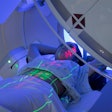
Radiation therapy for head and neck cancer (HNC) requires complex treatment planning that can vary considerably between institutions and physicians. In addition, significant short- and long-term side effects can occur that require management by a carefully coordinated multidisciplinary care team.
While National Comprehensive Cancer Network guidelines recommend that HNC patients should receive treatment at centers with expertise, it is not known whether the provider's experience affects survival. So U.S. and Canadian researchers analyzed the effect of institutional experience on overall survival in patients with stage III or IV HNC within a randomized trial of the Radiation Therapy Oncology Group (RTOG 0129), which compared cisplatin concurrent with standard versus accelerated fractionation radiotherapy.
 Evan Wuthrick, MD. Image courtesy of Ohio State University Comprehensive Cancer Center.
Evan Wuthrick, MD. Image courtesy of Ohio State University Comprehensive Cancer Center.The researchers found that experienced clinicians usually can achieve better outcomes for patients who are undergoing radiation therapy to treat HNC. Their findings are published in a study in the Journal of Clinical Oncology (December 8, 2014), which is accompanied by an editorial about the issue.
The researchers compared survival and other outcomes in 470 patients treated with radiation therapy at 101 treatment centers through a clinical trial held from 2002 to 2005.
Patients treated at the centers with less experience were more likely to have cancer recurrence, compared with those treated at the highly experienced centers (62% versus 42%, respectively, at five years), and had poorer overall survival (51% versus 69% five-year survival, respectively).
"Our findings suggest that institutional experience strongly influences outcomes in patients treated with radiation therapy for head and neck cancer," lead study author Evan Wuthrick, MD, an assistant professor of radiation oncology at the Ohio State University Comprehensive Cancer Center -- Arthur G. James Cancer Hospital and Richard J. Solove Research Institute, said in a statement. "They indicate that patients do better when treated at centers where more of these procedures are performed versus centers that do fewer."
The researchers identified 88 less-experienced centers that enrolled an average of four patients yearly to the trials and also 13 more-experienced centers that enrolled an average of 65 patients annually. Next, the researchers compared patient outcomes based on the two groups.
In the study, five-year local recurrence rates were higher among patients treated at less-experienced centers versus more-experienced centers (36% and 21%, respectively). The authors also noted that the radiation therapy plan was more likely to deviate from protocol at the less-experienced centers, compared with the centers with more experience (18% versus 6%, respectively).
The researchers also found that treatment at less-experienced centers was associated with a 91% increased risk of death and an 89% increase in progression or death when compared with more-experienced centers.
Institutional elements not assessed by the study that can also influence outcomes included use of a tumor board, the number of colleagues and their years of practice, and ancillary services, such as speech and swallowing therapy, dietetic and nutritional support, and specialized nursing, the study authors noted.
The trial was sponsored by the National Cancer Institute and organized by the Radiation Therapy Oncology Group.



















